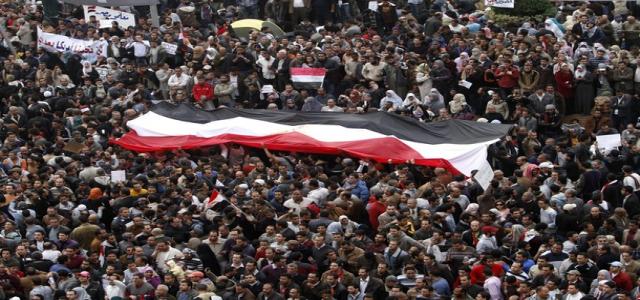|
||||||||||||
| :: Issues > Democracy | ||||||||||||

Egypt – How Did We Get Here?
History is being made in Egypt. What is happening now is undoubtedly a popular revolution against a dictatorship that has been stifling Egyptians for decades.
|
||||||||||||
| Thursday, February 3,2011 20:59 | ||||||||||||
|
||||||||||||
|
History is being made in Egypt. What is happening now is undoubtedly a popular revolution against a dictatorship that has been stifling Egyptians for decades. The whole world is witnessing the crumbling of the regime as the age of authoritarianism in the Arab world fades away. On Tuesday January 25 Egyptians managed to not only defy the oppression and arrogance of a self serving political regime, but they also proved they can challenge and revolt. Mubarak and his thugs have also acted in an unprecedented manner, refusing to step down as millions take to the streets demanding their removal. The government has acted violently, cracking down on peaceful protestors, as the world witnesses the authenticity of the people's protest and their desire for positive change. On Tuesday the uprising started with exemplary scenes of multitudes of Egyptians from all walks of life protesting on the streets of Cairo and all major cities of Egypt. The crowds were nonviolent, chanting out their frustrations and aspirations. However, Mubarak immediately intercepted and dealt with the demonstrators with his organized and ruthless army of security forces. Water cannons, rubber bullets, tear gas canisters as well as live bullets were being shot at protestors at will and when they were forced into side streets they were subjected to physical violence and intimidation. Egyptians are not shocked by the brutality of the Egyptian regime as it sought to abort the nonviolent uprising which was transmitted live by international news channels. Such behavior is expected and typical of a regime that has continually degraded its population and has removed hope from the lives of average Egyptians. The primary role of Egyptian police is to look after the dictator in return for privileges and authorities offered to them by the regime. The security forces reflect the delusion and paranoia of the regime while the relationship between the government and the people is largely characterized by fear and submission. Rigged parliamentary and presidential elections only served to secure yet another term of autocratic power to Mubarak and his chosen ring of corrupt politicians. Reflecting this framework of tyranny, police stations are places of humiliation and intimidation by police officers to average Egyptians. The regime hopes that by cracking down hard on protestors, the people will think many times before trying something like this again. Facebook and Twitter were indispensible for protestors to organize and galvanise the idea of uprising. Knowing this, the regime first blocked these social media but when that proved insufficient, they shut down the internet and even the mobile phone network. All this happened while security forces attacked the peaceful protestors trying to crush their resolve. The protestors welcomed the military, unaware of what the regime was planning. Police stations became deserted leaving detectives and soldiers without any command and then they were given orders to release the prisoners. Jail breaks occurred simultaneously, ushering in a sweep of violence, theft and murder around Cairo as well as other towns and villages around Egypt. This led to panic and intimidation because of the absence of security forces. The government hoped that by experiencing the harsh realities of anarchy the people would prefer Mubarak to no stability at all. However, despite the plotting, the streets of Egypt remain filled with peaceful, determined protestors calling for Mubarak and his regime to step down. Further depicting government corruption, many of the arrested looters and thugs were carrying police identity cards and others were using the guns taken from police stations, clearly indicating the conspiracy carried out by the police. The world is watching the crisis in Egypt with great interest. Egypt is America's main ally in the region and plays a pivotal role in the Arab world and the Middle East. It is also the recipient of the second largest amount of American military aid. However, the most significant point is the fact that it is the largest Arab country neighboring the state of Israel with which it signed a peace treaty in 1979. America and Israel fear that the post-Mubarak era would shift Egypt toward democracy and that free elections would bring the Muslim Brotherhood to power. After supporting the Egyptian dictatorship for almost 30 years, they hate to see an Islamist government on the borders of Israel. In the meantime, Egyptian protestors continue their peaceful protests. They have braved violence and intimidation from security forces, attacks from Mubarak's criminals and thugs and are showing their determination to demonstrate until Mubarak steps down so Egypt can breathe once again, and move forward. |
||||||||||||
|
tags: Egypt / Mubarak / Protest / Security Forces / Egyptian Regime / Rigging / Parliamentary Elections / Presidential Elections / Elections / Facebook / Cairo / Arab World / Middle East / Muslim Brotherhood / Islamist / Day of Rage / Protests / Egyptian Government / Mubarak Regime / Egyptian Regime / Egyptian Democracy / Revolution / Political Regime / Peaceful Protestors / Demonstrators / Police / Police Station / Twitter / Prisoners / Corruption / Peace Treaty / 25 January / Egyptian People / Human Rights in Egypt / Anti-Government / Politicians
Posted in Democracy , Reform Issues |
||||||||||||
|
||||||||||||
|
||||||||||||
| Related Articles | ||||||||||||
|
|






